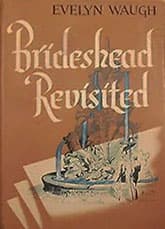Brideshead Revisited
CRITIQUE | QUOTES | AT THE MOVIES
 First U.S.edition
First U.S.editionSubtitle
The Sacred & Profane Memories of Captain Charles Ryder
First publication
1945, England
Literature form
Novel
Genres
Literary
Writing language
English
Author's country
England
Length
Approx. 110,000 words
The thread about to snap
Why do we still read Brideshead Revisited?
An account of aimless, upper-class, young men wasting their time at Oxford University in hedonistic pursuits. Until the story is swallowed by the larger theme of an intensely Catholic, intensely self-absorbed, aristocratic family. Presented nostalgically and somewhat ornately. Hardly the stuff of popular fiction with which today's readers could identify.
Why do we care? In part because Evelyn Waugh is such a clever writer.
The novel quickly gathers us into friendship and sympathy with the spoiled, dissolute students we would normally find without redeeming value. And we remain attached as the novel delves into the background of one of them, the charismatically homoerotic Sebastian Flyte, to uncover the even more alien world of his family, headed by Lord Marchmain, and their family castle, Brideshead.
How Waugh does this, I'm not sure. His first clever move is to introduce the story from the perspective of the Second World War. Charles Ryder is an army officer whose soldiers are billeted in the now deserted Brideshead. He is jolted into recalling his time with Sebastian and the young man's eccentric relatives. It's hard not to be taken in, as Sebastian's family enmeshes everything and everyone it comes in contact with.
Reckoning to come
This deliberate positioning of the story before the war—seen from the war—is a kind of a signal to the reader that the author, like his narrator, is aware of the shallowness of much that transpires. It gives us licence to enjoy the young men's escapades and their oh-so-witty and ironical dialogue. At the back of our minds, we know a great reckoning is coming.
Charles's voice is also wonderfully nuanced. As the character that he was two decades ago falls under Sebastian's wayward influence and later into the family drama, Charles the narrator seems both enchanted by those golden days and despairing of them. Much like Scott Fitzgerald's narrator/observer of great wealth (and at about the same time too) in The Great Gatsby.
This ambivalence becomes most clear in the recall of his final days with the family at Brideshead. By that time, a more mature Charles Ryder had become an establishment figure, a well-known but superficial artist specializing in painting old architecture. But as the family's religiosity, which was absent in the early going of Brideshead Revisited and has been gradually filtering into the plot, comes to a head, Ryder still plays devil's advocate—before finally giving in completely.
The ending of that remembered episode and the book's epilogue, back in wartime again, tries to convince us the issue has been resolved in Charles's mind on the side of the angels.
Religious conventions
But, frankly, Brideshead Revisited loses me by then, at least in my latest reading of the novel. I find, to my surprise, I yearn for the earlier, more frivolous but startlingly engaging antics of Charles's effete Oxford friends, Sebastian and the flamboyantly Oscar Wilde-ish character of Anthony Blanche. At least they were rebelling against social norms, however frivolously.
Sebastian is gradually sidelined as Charles (and we) become more deeply involved in his family. Finally he disappears from the narrative altogether, except as a ghostly figure in people's stories, a broken, alcoholic man seeking salvation abroad. As silly and as maddening as he was, the early Sebastian is sorely missed as the novel takes a more traditional turn and Charles takes up with Sebastian's sister Julia.
A character references Antic Hay at one point: Aldous Huxley's novel is called the "book of the moment" (apparently this is 1923). Like several Huxley novels, Antic Hay satirizes aimless young intellectuals and artists after the First World War, while suggesting more serious underlying—often spiritual—matters are being worked out. It may be Waugh is attempting something similar in Brideshead Revisited, and this is to be appreciated. But moving into the embrace of the most conventional of religions at the behest of a dying aristocratic class is hardly a bold advance into relevance.
A more charming take on this theme comes with reference to another modern religious writer. Julia recalls with Charles an evening at Brideshead, when Lady Marchmain read to the family from one of G.K. Chesterton's Father Brown stories. In the mystery "Queer Feet" the detective-priest describes himself as a fisher of men and tells of catching a thief, hearing him repent and letting him go: "I caught him, with an unseen hook and an invisible line which is long enough to let him wander to the ends of the world, and still to bring him back with a twitch upon the thread." The third and final book of Brideshead Revisited, in which the wayward young adults variously return to the church is entitled "A Twitch Upon the Thread".
Waugh is supposed to have predicted a rough going for his novel due to its religious content. There may be something to this. But it's only part of the problem that makes this novel appear less relevant each time it's read.
Despite the novel featuring some great writing, uncanny dialogue, and enthralling characters, I wonder how much longer we will care to revisit Brideshead.
— Eric
CRITIQUE | QUOTES | AT THE MOVIES

